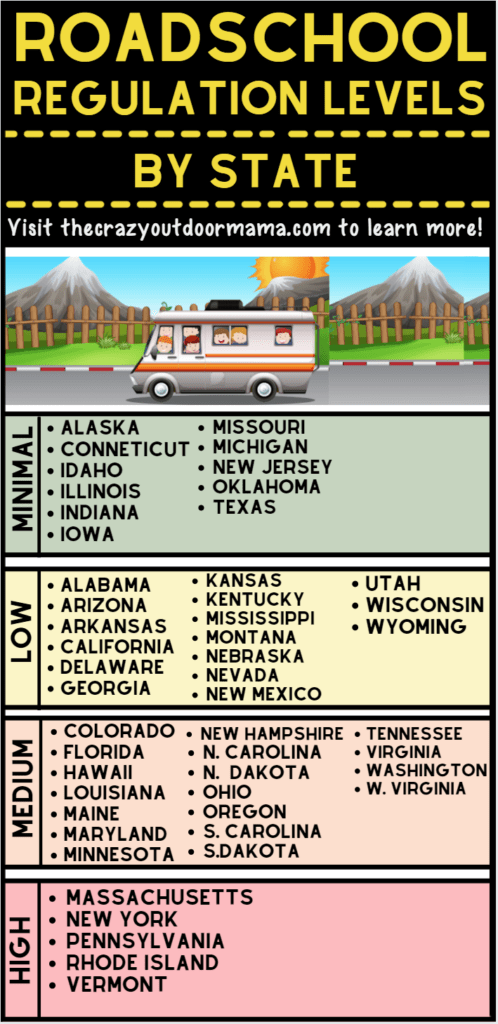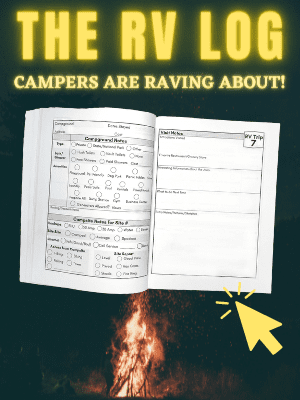- Top 5 Roadschooling Destinations in the Northeast and New England - September 2, 2021
- Top 5 Roadschooling Destinations in the Midwest - July 2, 2021
- Top 5 Roadschooling Destinations in the Southeast - June 21, 2021
As a roadschooling family, we get asked a lot of questions about our lifestyle. It seems no matter where we travel, the questions are pretty much the same…
- So you really don’t have a house anywhere? Just the RV?
- Do you have, like, jobs and stuff? How do you get money?
- So I guess you guys homeschool the kids, right? Is that even legal?
The answer to this last question is yes. Roadschooling can absolutely be done legally, but it can also be complicated. Education laws vary from state to state, so each family needs to research their specific circumstances and should consider consulting a lawyer to resolve any unanswered questions.
If you’re new to roadschooling, don’t forget to check out my roadschooling 101 article here that will set you in the right direction!
Disclaimer: I am not a lawyer and I am not qualified to give legal advice. This guide is a collection of resources that are freely available to the public, and is intended only to assist other families in doing their own research.
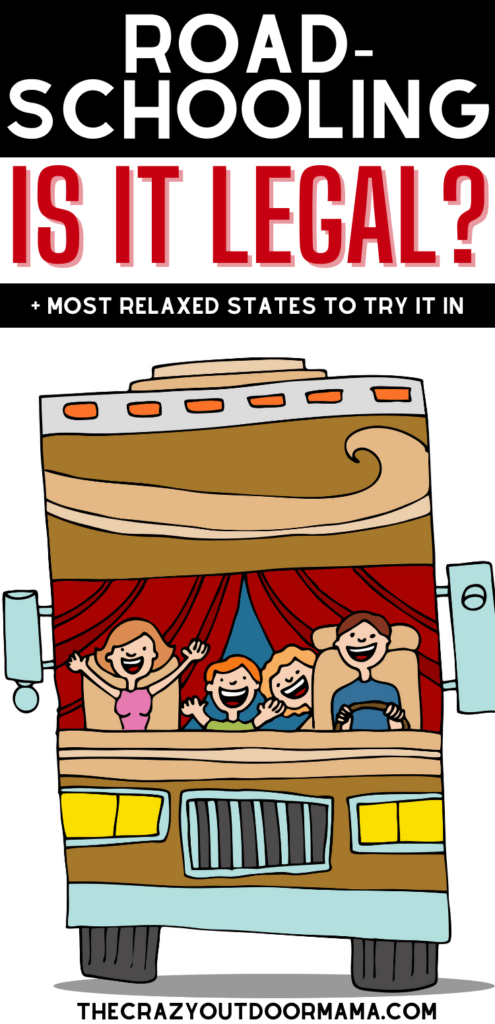
I may be an affiliate for programs or products mentioned in this article and I will receive a commission at no extra cost to you. These programs and products come highly recommended by the expert who is writing the article and we hope they help you!
Table of Contents
Homeschooling Laws by State
The first step is to figure out what the homeschooling laws and requirements are in your state. The tremendous variations between states can have a big effect on how your family legally approaches roadschooling. You should be able to find this information through the website of your state’s department of education. You can also find detailed overviews, video explanations, and other relevant information through the Home School Legal Defense Association (HSLDA).
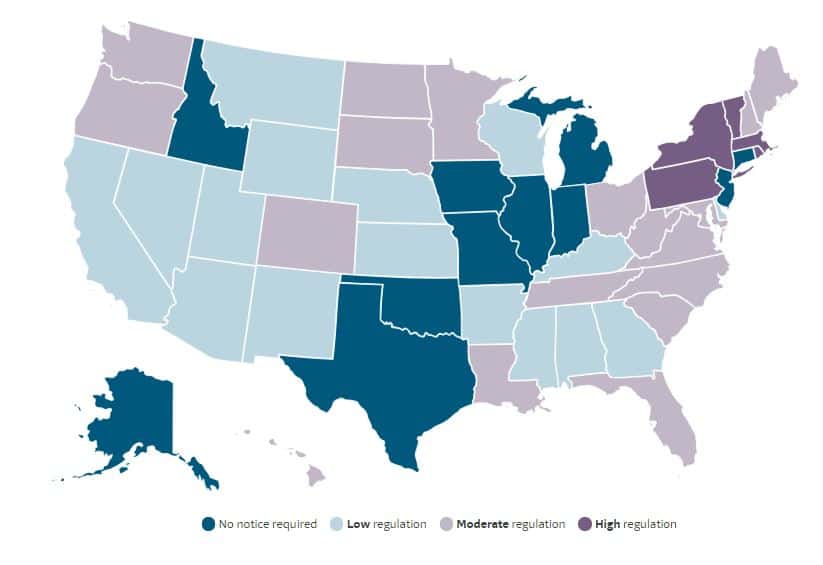
From this graphic, you can see that the HSLDA classifies states into 4 categories, based on how highly regulated homeschooling is for residents of that state.
States where no notice is required:
Alaska, Connecticut, Idaho, Illinois, Indiana, Iowa, Missouri, Michigan, New Jersey, Oklahoma, and Texas.
These states have little to no oversight of the homeschooling process, including no required assessments. This is very helpful for roadschooling because there is no need to appear in person, which can be difficult to do when you’re traveling.
States with low regulation:
Alabama, Arizona, Arkansas, California, Delaware, Georgia, Kansas, Kentucky, Mississippi, Montana, Nebraska, Nevada, New Mexico, Utah, Wisconsin, and Wyoming.
These states generally have few legal restrictions or expectations, beyond the need to file paperwork with the state notifying them of your intent to homeschool. This paperwork may need to be filed every year. Some states with low regulation do require assessments, though, so be sure to check the details of your state. Residents of these states can roadschool relatively easily, but need to be aware of state requirements.
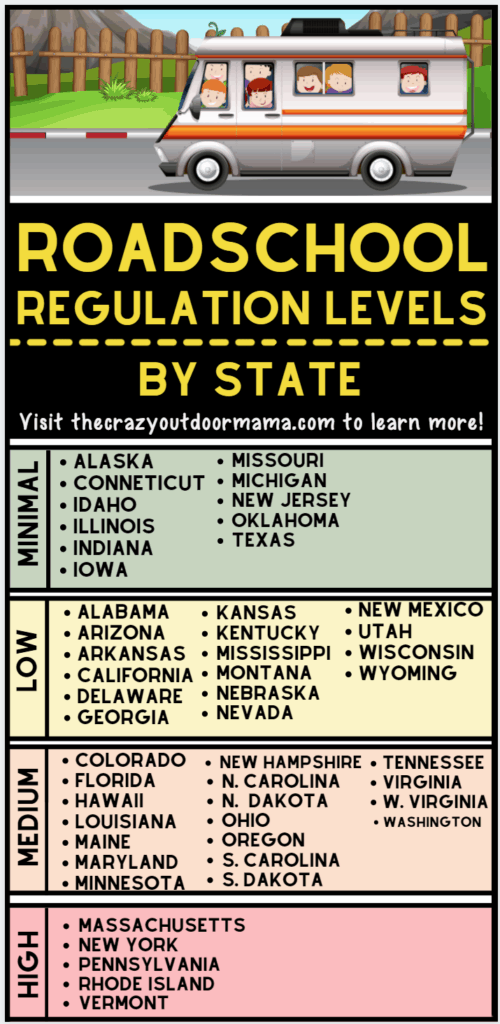
States with moderate regulation:
Colorado, Florida, Hawaii, Louisiana, Maine, Maryland, Minnesota, New Hampshire, North Carolina, North Dakota, Ohio, Oregon, South Carolina, South Dakota, Tennessee, Virginia, Washington, and West Virginia.
Homeschool laws in these states are more strict and often include some kind of regular evaluation or assessment. They require more record keeping than many other states, but expectations vary so be sure you understand the requirements in your state of residence. Roadschooling is definitely possible for residents of these states, but you will likely need to spend part of each year in your home state.
States with high regulation:
Massachusetts, New York, Pennsylvania, Rhode Island, and Vermont.
Homeschooling in these states is highly regulated in ways that make roadschooling difficult (though not impossible). You will almost certainly be required to appear in person on a regular basis and you must keep thorough records of attendance hours, lesson plans, grades and student performance. Many families find these regulations prohibitive to roadschooling.
Changing Domicile State
If your state regulates homeschooling in a way that makes it difficult to pursue the roadschooling lifestyle, you may want to consider changing your state of legal residence, or domicile. When home is where you park it, your legal address is generally just a matter of paperwork.
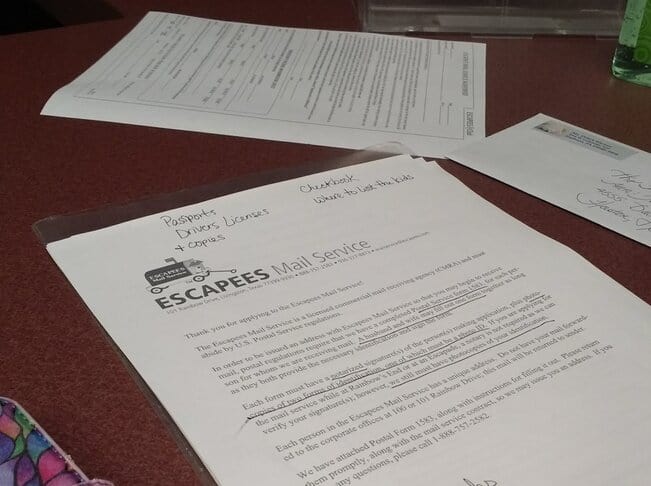
* Important Vocabulary: Domicile and residence are not always interchangeable when it comes to legal definitions. Residency can be temporary or short-term. Domicile implies more permanence.
There are many factors involved in choosing a domicile state, and homeschooling laws are just one of them. In some states, it is difficult to establish residency as a full-time RVer because they may require you to own or lease property, or to be physically present in-state for a certain length of time. Factors such as state income tax rates are also worth considering.
Though many official functions can be done online or via mail these days, there are circumstances where appearing in person may simplify the process or even be required. For this reason, many families prefer to establish residency in places where they travel often, such as near family or close friends.
It may not be necessary to change residency in order to roadschool in a way that is both legal and convenient. Among roadschooling families who do choose to establish domicile in a new state, the most popular states to do so are Texas, South Dakota, and Florida. This despite the fact that South Dakota and Florida are both classified as states with moderate homeschool regulation.
Step 1: You Need an Address

The process of establishing domicile varies from state to state, but all states require you to have an address. While there are a variety of different mail forwarding services available across the country that work well for RVers, not all of these provide addresses that are legal for establishing domicile. If you are not changing states, then you have already established domicile and this may not be a factor for you. If you are changing states, this is an important question to ask your service before signing a contract.
You should always do your own research to be sure you find the best option for your family, but it can be hard to know where to start. Here are some popular options for “moving” to the three most common domicile states for roadschoolers:
Texas
Florida
South Dakota
We chose to use the Escapees mail service to establish domicile in Texas. Many of our fellow roadschooling families are our “neighbors” with similar addresses. The Escapees staff are extremely knowledgeable and helpful. They walked us through the process from the beginning, and we have been very happy with the service for several years. Escapees is an excellent option for changing domicile to Texas, Florida, or South Dakota.
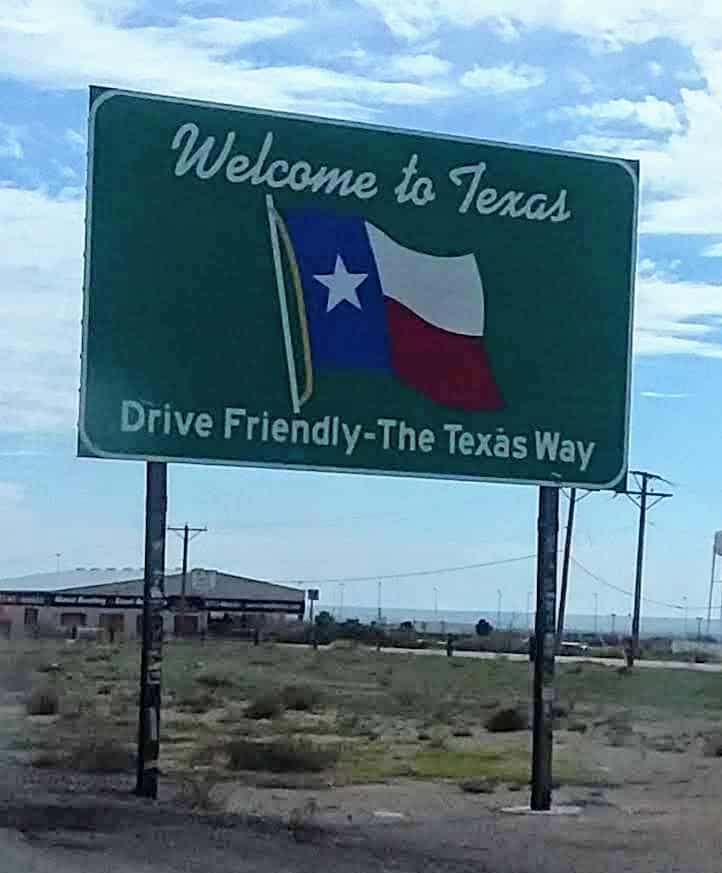
Alternatives to Homeschooling
All roadschooled kids are homeschooled, in the sense that they are learning at home and do not attend traditional schools. When it comes to legal definitions, however, homeschooling is just one of your options.
Online Distance Learning
Attending online school is available in most states as an alternative to public school. These can either be online public schools or they can be considered private schools. Depending on your state, online schools may be free, or they may charge tuition.
The advantage to online schools is that there are no expectations for the parents to be the teachers. The curriculum is planned, taught, and evaluated by certified teachers. The school keeps records of attendance and grades, and students can get a traditional transcript of their course work.
The biggest disadvantage is that it lacks flexibility and can make roadschooling more difficult. Students may be required to log in to school at specific times and for a specific number of hours. They will have assignments with deadlines, and you will not be able to adapt the curriculum to complement your travels.
In some states, students enrolled in online schools are discouraged (or even prohibited) from traveling out of state, so it may not be an option for you. Others, such as Achieve Virtual School of Indiana, consider travel an advantage that enhances their students’ educations, so they encourage it.
Umbrella Schools
Umbrella schools can be found in most states. Enrolling in an umbrella school is a particularly popular option for roadschooling families who choose to domicile in Florida.
These legally registered private schools get their name because they “cover” homeschooling families and take care of the legal supervision requirements from the state. These schools typically charge a fee for enrolling your child(ren), and in return they take care of filing paperwork and keeping necessary records.
Policies vary from school to school, but many umbrella schools encourage the roadschooling lifestyle and are experienced in making the process smooth for traveling families. Enrollment in an umbrella school comes with peace of mind, knowing that professionals are taking care of the red tape.
There are a variety of options, so choose an umbrella school that aligns well with your educational philosophy and that is comfortable with your family’s choice to travel full-time. The specific county where the school is registered may also be a factor, since some counties may require more detailed attendance records, immunization records on file, or other additional documentation.
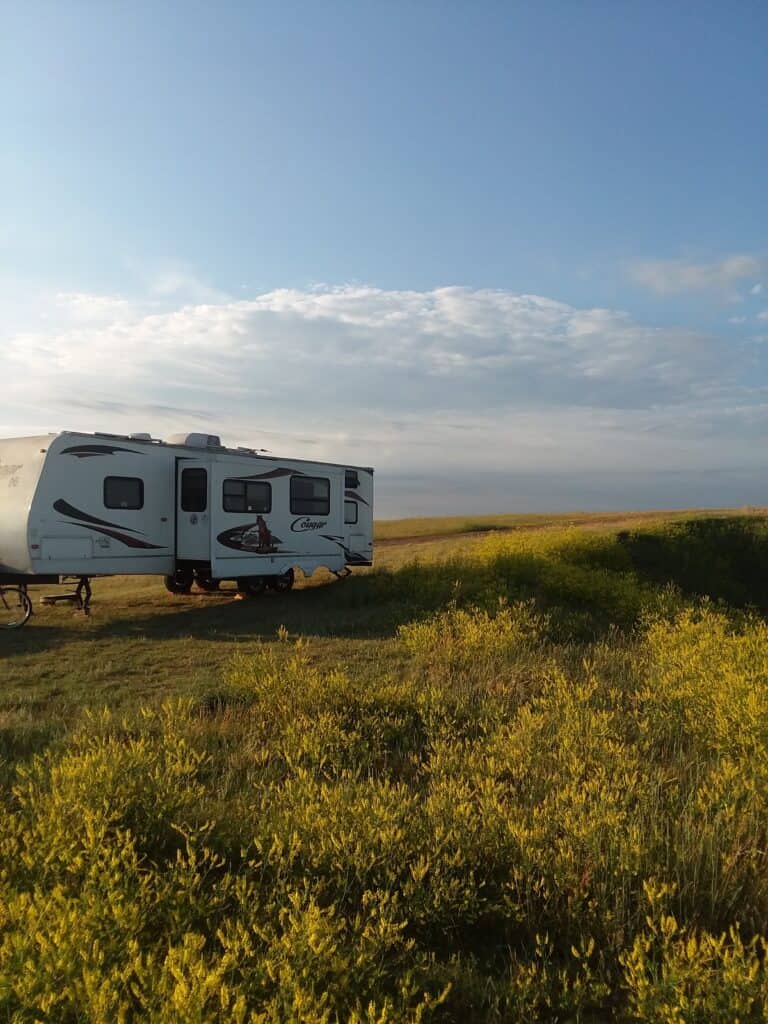
Charter Schools
Charter schools can work for roadschooling in a variety of ways. Often they function similarly to an umbrella school, offering supervision and record keeping for homeschool students and their families. The primary difference is that umbrella schools are private schools and charter schools are technically considered part of the public school system.
Charter schools still have a lot of the same freedoms that are typically associated with private schools, but in most states charter schools are government funded.
This means enrollment in a charter school is often free, or at least much more affordable than many private schools. An additional bonus is that in some states, such as California, students enrolled in a homeschooling charter school can also receive a budget to be spent on educational materials such as curriculum, extracurricular activities, field trips, and more.
With money comes additional oversight. Some families enjoy working regularly with a teacher who can give support, ideas, and feedback. Others prefer not to have to keep detailed portfolios and review them regularly with their supervising teacher. There are tradeoffs to receiving government funding for your roadschooling adventure, but you may decide it’s worth it.
Again, each state has different rules and provisions for homeschool charter schools, so find out what’s available in your state!
Time Limits
Here’s where things can get a little fuzzy for roadschoolers. The HSLDA recommends following the homeschool laws of the state where you are physically present. Obviously this is a challenge in a lifestyle that leads you to be physically present in new states frequently.
The general rule is that if you stay in a specific state for longer than 30 days during the school year, you should follow the homeschool requirements for that state. This doesn’t present an issue in states that require no notice for homeschooling. In other states, it can be much more complicated.

You can avoid the issue by staying less than 30 days in each state during one school year and planning your longer stays in states that do not require notice for homeschooling. If this is not practical for your family’s needs, consult a lawyer to learn more about your options and obligations.
High School Transcripts and Graduation
Many families worry about roadschooling with teens, especially as relates to their kids completing high school and being able to apply to colleges or trade schools, and for jobs. These issues are important to think about, but definitely do not prevent a family with teens from roadschooling. There are certainly plenty of families who are roadschooling right through to graduation (and beyond).
If your kids are enrolled in an online, umbrella, or charter school, this isn’t something you need to worry about. Their course work is tracked and they will graduate with a transcript and everything needed for work or further education. Some families choose to enroll older children in these types of schools when they reach high school in order to simplify the process.
Otherwise, follow the same procedures as homeschoolers for creating your child’s transcript and graduating him or her from high school. These procedures vary from state to state, so look to homeschool groups from your domicile state or the HSLDA for guidance.
Summary…
- Roadschooling is legal and is generally classified as homeschooling. Homeschooling laws vary widely from one state to the next.
- Roadschooling families can change their state of domicile in order to choose a state with more favorable homeschooling laws. There are a variety of ways to do this.
- There are alternatives to homeschooling for families who want to roadschool. These include online schools, umbrella schools, and charter schools.
- Carefully plan how long you will stay in each state to avoid being subject to their homeschool laws, even as a non-resident.
- Roadschooling high school is possible, so there’s no need to stop traveling when your kids reach their teen years.

